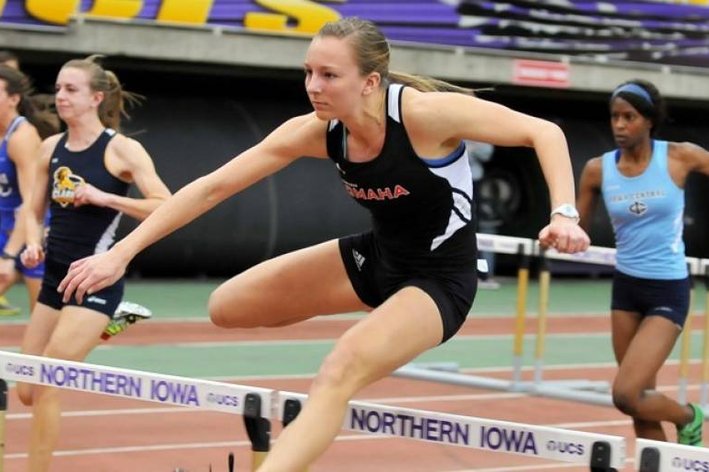She impressed everybody with her work ethic. And by the spring of 2011, she qualified for the division II nationals and finished fifth in the heptathlon. That led to her next quandry: UNO had already decided to make the jump from division II to division I. In doing so, UNO had agreed to be ineligible for the NCAA championships during a four year transition.
Nobody really thought much about Spenner at that time; she was just a freshman that hadn't accomplished anything in college track. But by last year, she was suddenly a national contender in division 1. Only problem? She was ineligible to compete at the NCAA track championships, even though she was ranked third nationally. UNO tried to appeal to the NCAA, but the NCAA refused, saying that there was a lack of "extenuating circumstances."
UNO's decision to move to Division I was the right decision for the school. Football and wrestling fans will disagree, obviously. But UNO's finances are better as a division 1 school, and baseball and basketball have shown that they can compete at this level. Nobody anticipated that UNO would have an athlete contending for national honors like Spenner.
Fast forward to 2014, and Spenner is having a great indoor track season. Last week, she scored 4,406 in the pentathlon, which not only leads the U.S., but also ranks third in the world. She's only the sixth collegiate athlete to ever top the 4,400 point mark in that event.
And she's still ineligible for the national championship.
I understand why the NCAA has their rules for schools transitioning to division 1. They don't want schools to do this haphazardly, and it makes sense that teams are not eligible... even if four years might be a bit excessive.
This rule doesn't make sense when applied to the Spenner situation, though. Athletes qualify for the NCAA tournament on the basis of their individual performances. And Spenner has clearly done that. But by insisting on a strict interpretation of a rule, the NCAA has marked themselves as an inept institution more concerned with their rules than their mission.
NCAA always there for student athletes? http://t.co/5riXxEh3Ny To do what? What an embarrassment. Let her compete.
— Jay Bilas (@JayBilas) February 7, 2014
Spenner did have a choice in this matter. She could have transferred from UNO to another school and been immediately eligible to compete - and compete at nationals. But she chose to stay at UNO because of academics; UNO's exercise science program is highly regarded, and she had a 3.79 GPA at the end of last spring.So why should an athlete have to choose between being a student and an athlete, especially when she's proven fully capable of doing both?
NCAA squints, peers into its scope, sees red dot on its target, exhales calmly, and fires a shot right into its foot: http://t.co/xkgoI7VHDs
— Adam Jacobi (@Adam_Jacobi) February 7, 2014
Will the NCAA change their mind and do the right thing? They've had several chances and refused to this point. The only way it happens is if the NCAA realizes just how embarrassing their actions have become. And that requires each of us to make sure the NCAA hears it.#letSamiRun


No comments:
Post a Comment